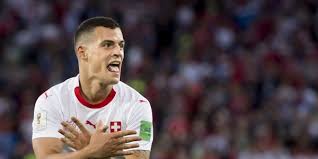By Andrew Warshaw
July 9 – The extent of the rift within the Swiss camp following their exit from the World Cup has been widely exposed by an unprecedented outburst from their Arsenal midfielder Granit Xhaka in response to comments made by Swiss FA secretary general Alex Miescher.
The ongoing debate in Switzerland over whether the national team is ‘Swiss enough’ has been a hot topic ever since sanctions were handed out by FIFA to Xhaka and teammate Xherdan Shaqiri who both have Kosovo-Albanian backgrounds and celebrated goals scored against Serbia in the group stage with a hand gesture representing the “double eagle” of the Albanian flag.
The debate reached new levels of controversy after Miescher was quoted in the Tages Anzeiger newspaper as saying: “Maybe it should be asked: do we want dual nationals? The incident with the double eagle shows there is a problem.”
The message divided opinion with some supporting the two players – whose families moved to the country during the 1998-99 war between Kosovo ethnic Albanian forces and Serbia – and others criticising their split loyalty.
Around two thirds of the Swiss national team, who were knocked out in the round of 16 by Sweden, have a foreign background and at the weekend the federation tried to distance itself from the row. But the damage had already been done and Xhaka reacted furiously, describing Mieschler’s remarks as “Stone Age commentary”.
“I hear in his [Miescher’s] words that he doesn’t trust dual nationals to give their all for Switzerland,” Xhaka told the mass-circulation Blick newspaper. “Just after we experienced a tough defeat in Russia, you don’t do that.”
“We are all Swiss and give everything for the Swiss national team – all of us, because we know, and are thankful for, everything Switzerland had done for us and our families.”
Xhaka, whose brother Taulant plays for the Albanian national side, added: “The (Miescher) interview quickly did the rounds among the national team. Even during the World Cup and after my double-headed eagle (celebration), Alex came up to us and assured him that he would do anything to protect us – and then three days after we left, such statements came from him.”
Mieschler’s point was that some Swiss players with dual nationality get the best out of their development, then opt to play for someone else.
“Such a player has taken away a very valuable, expensive training place…Maybe we could say that the doors to funding programmes are open only to junior players who do not have dual citizenship,” he was quoted as saying. “Today, we benefit from the strength of our national team. But if Bosnia, Croatia, Albania and certain African countries were present at a future World Cup, we could have trained many players for other nations.”
But the way he phrased his objections caused uproar.
“This directly affects me and a few others with two nationalities. It sounds to me as I and my colleagues in Swiss team would not go to the limit,” said Xhaka.
“My family roots are in Kosovo – as they are for (teammates) Breel Embolo in Cameroon, Manuel Akanji in Nigeria and Ricardo Rodriguez in Chile and Spain.
“The Swiss national team…today there are 50 to 60 percent double citizens or second generation players. Even our manager (Vladimir Petkovic) is dual citizen who gives blood and sweat to the national team. I think Alex certainly has questionable, Stone-Age opinions.”
Contact the writer of this story at moc.l1734979608labto1734979608ofdlr1734979608owedi1734979608sni@w1734979608ahsra1734979608w.wer1734979608dna1734979608

